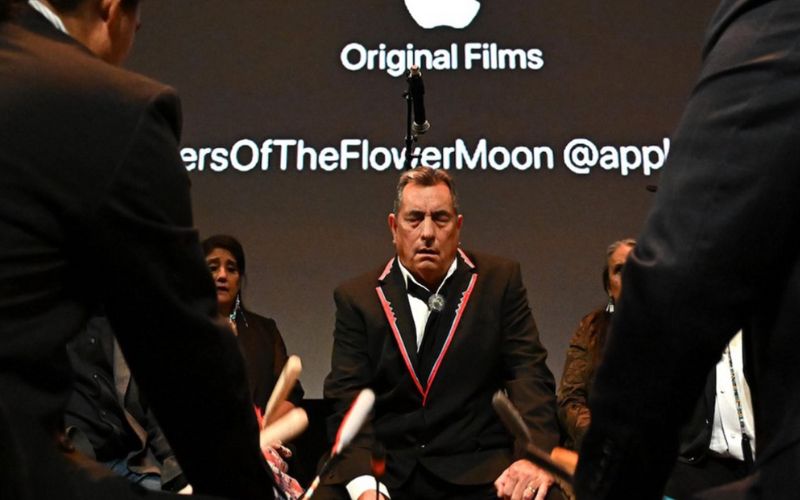
- Details
- By Kaili Berg
In a historic moment for Indigenous representation at the Academy Awards, Scott George, a member of the Osage Nation, is the first Native American to receive an Oscar nomination for Best Original Song with his composition, “Wahzhazhe (A Song For My People)” for Martine Scorcese’s Killers of the Flower Moon.
This landmark nomination not only celebrates George’s talent but also serves as a powerful testament to the resilience and cultural richness of the Osage Nation and Indigenous peoples worldwide.
The song is an anthem written and performed in the Osage language. It encourages tribal members to rise up, be strong, and have faith through life’s ordeals. George, a respected figure within the Osage community, collaborated with two dozen female and male singers who gathered around a drum to create the piece of music.
“If it wasn’t for God, Wakanda, we wouldn’t be here,” George told Osage News in January. “I’m asking our people to stand up, basically, and be proud of the fact that God created a way for us. So that’s the thought behind it, anyway.”
Beyond his musical accomplishments, George serves as a Housing Director for the Citizen Potawatomi Nation’s Housing Department, working to accommodate low-income community members. He is a skilled musician who has spent 40 years performing Osage ceremonial dances, earning him the title of “head singer” in his tribe.
As a music consultant for “Killers of the Flower Moon,” George played a pivotal role in ensuring the authenticity and cultural integrity of the film’s soundtrack. His expertise and passion for preserving Osage tradition have garnered widespread admiration, both within and outside the Indigenous community.
“To have one of our own, Scott George, along with all the Osage singers we hold in such high esteem, be recognized in this way is surreal, and I know comes from a place of humbleness from Mr. George,” Pamela Shaw, Congresswoman for the Osage Nation Congress, said in a press release. “This moment in time is emotional for many of us, impacting all Osages in different ways.”
George’s Oscar nomination marks the first time an Indigenous artist has been recognized in the Best Original Song category, signaling a long-awaited shift towards greater diversity and inclusion in the entertainment industry.
The excitement surrounding George’s nomination has sparked a wave of support from Indian Country and Hollywood insiders. Social media platforms have been abuzz with messages of encouragement and solidarity, with hashtags like #IndigenousExcellence and #OscarNominee ScottGeorge trending globally.
On March 10, Scott George and the Osage Tribal Singers will take the stage at the Oscars Ceremony in Los Angeles to perform “Wahzhazhe."
“It’s just kind of crazy. I’m shocked and honored to represent our people in that manner, but the weight of it really hasn’t landed on me yet,” George told Osage News in January.
More Stories Like This
Zuni Youth Enrichment Project and Partners at Ho’n A:wan Productions Launch 8th Annual Delapna:we ProjectChickasaw Holiday Art Market Returns to Sulphur on Dec. 6
Center for Native Futures Hosts Third Mound Summit on Contemporary Native Arts
Filmmakers Defend ‘You’re No Indian’ After Demand to Halt Screenings
A Native American Heritage Month Playlist You Can Listen to All Year Long
Help us defend tribal sovereignty.
At Native News Online, our mission is rooted in telling the stories that strengthen sovereignty and uplift Indigenous voices — not just at year’s end, but every single day.
Because of your generosity last year, we were able to keep our reporters on the ground in tribal communities, at national gatherings and in the halls of Congress — covering the issues that matter most to Indian Country: sovereignty, culture, education, health and economic opportunity.
That support sustained us through a tough year in 2025. Now, as we look to the year ahead, we need your help right now to ensure warrior journalism remains strong — reporting that defends tribal sovereignty, amplifies Native truth, and holds power accountable.
 The stakes couldn't be higher. Your support keeps Native voices heard, Native stories told and Native sovereignty defended.
The stakes couldn't be higher. Your support keeps Native voices heard, Native stories told and Native sovereignty defended.
Stand with Warrior Journalism today.
Levi Rickert (Potawatomi), Editor & Publisher


